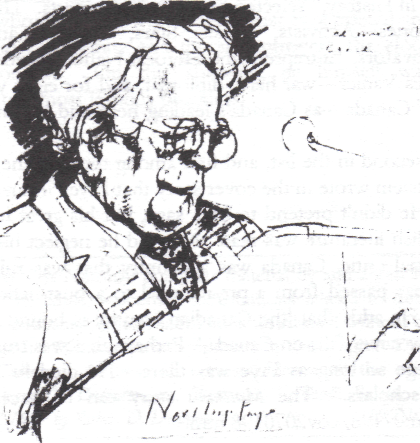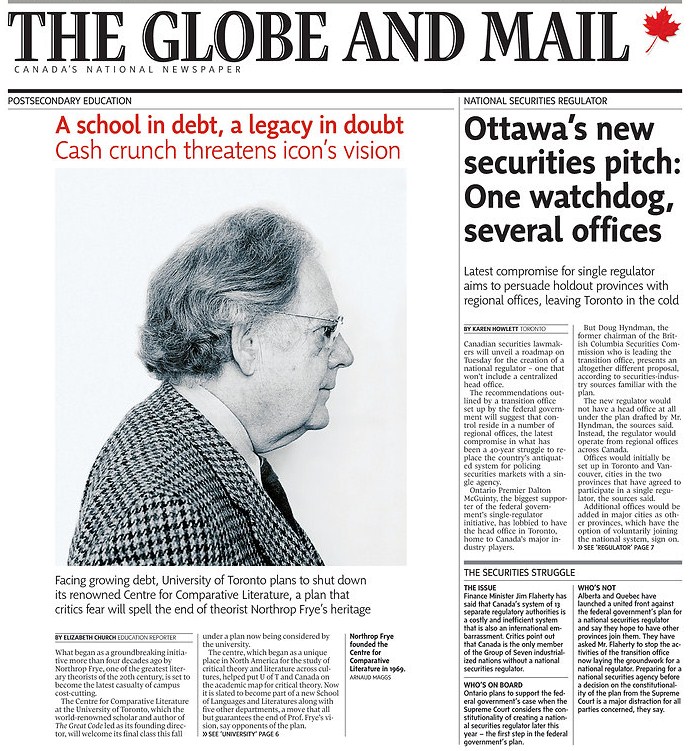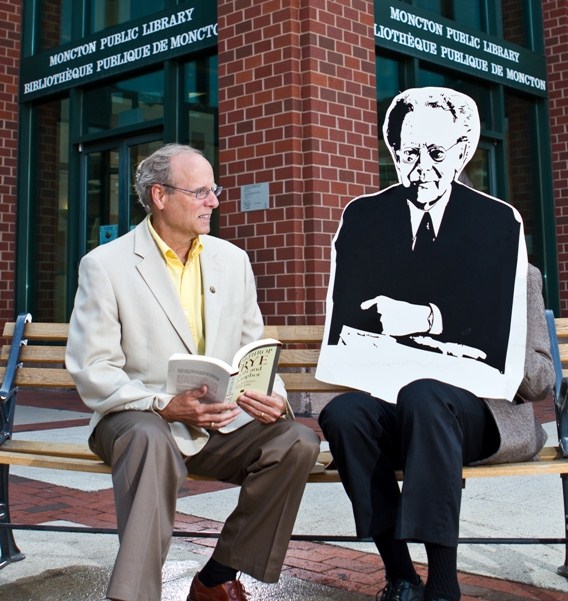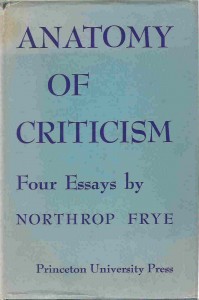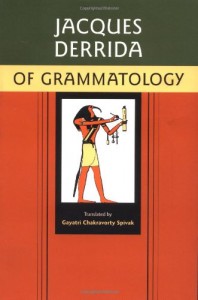My friend Tamara Kamermans offers this term to describe scholars who display irrational hostility toward Frye: “Fryechosis.”
Daily Archives: July 13, 2010
Centre for Comparative Literature Update
The Globe and Mail has a story today here.
Frye Alert
Moncton mayor George LeBlanc chats with Northrop Frye at the site of the future public art display.
For those of you who’ve been voting daily for the proposed Frye sculpture, the proposal now sits in sixth (that’s 6th) place. Only the top two proposals will receive a $25,000 prize. So, of course, we’re encouraging everyone to be sure to vote daily.
Happily, Dawn Arnold has simplified the process by providing a direct link to the vote button here: http://www.refresheverything.ca/fryefestival For those of you who’ve already registered with the site and voted, just hit that link, sign in, and then hit the vote button at the bottom of the page. If you’ve not yet registered or voted, please do so as soon as you can.
And remember: you can vote every day. So be sure to bookmark that link.
From an article about the proposed sculpture in today’s Times & Transcript:
The city and Downtown Moncton Centre-Ville Inc. have been promoting the idea of more public art in the downtown area and Arnold says now is the time to celebrate Moncton’s most famous son. Arnold says a statue of Frye would feed the imaginations of others in the community, contribute to a more vibrant and visually rich community and celebrate the growing importance of literacy in our society.
The statue would also become a bit of a tourist attraction, a place where people could go to have their photo taken like the Bronze Fonz in Milwaukee, the statue of Winston Churchill in Halifax; or the statue of John Lennon in Havana, which portrays the famous Beatle sitting on a park bench, turning to his left as if in conversation with whomever happens to sit next to him.
Here once again is a direct link to the voting site: http://www.refresheverything.ca/fryefestival
So, go already!
Dawn Arnold: Frye Sculpture Update
httpv://www.youtube.com/watch?v=47PGGjiLd54
The Frye Festival needs your help to create a life-sized bronze sculpture of Northrop Frye, sitting on a park bench, reading a book, in front of the Moncton Public Library. We have entered a national contest hosted by Pepsi Canada that offers non-profit organizations the chance to win money for projects that have a positive impact on their community. But, we need your votes to win because winners are chosen exclusively by the number of votes they receive.
The contest runs until August 31 and participants can vote daily for their favourite project.
Visit www.frye.ca and click “Vote now!”. In the bottom left hand corner of your screen (www.refresheverything.ca/fryefestival) you will see “Welcome!” and then in yellow “Join Refresh Everything”. Once you have joined (this involves inputting your first and last name, your e-mail and choosing a personal password) you can then vote. Find the project in the “Arts and Culture” (blue) category and within the “$25,000” section.
Vote daily to do your part to help create a lasting legacy for Northrop Frye! The world needs more Frye, now more than ever! Tomorrow is Frye’s 98th birthday. Make this your gift that keeps on giving.
You can read more about the project in today’s Monction Times & Transcript here.
Frye and Poststructuralism
Tomorrow is Frye’s birthday, and the day after that is Derrida’s. It’s a good time to reflect on their fateful collision as two leading figures in literary criticism a generation ago.
From the time of the Anatomy Frye maintained that criticism should be a system of interpenetrating rather than conflicting modes. But as poststructural critics came to take center stage in the 1970s and 1980s, Frye grew less sanguine about realizing his critical ideal. In his last major works, Words with Power and Myth and Metaphor, he began to take an oppositional stance toward poststructuralism, especially to cultural criticism and deconstruction. But as one might expect from a critic who very seldom argued in a public way against critical views different from his own, his critique of these two postmodern approaches is relatively muted. This is not the case, however, in Frye’s unpublished notebooks, where his critique of, say, Derrida, is explicit and direct. The degree of Frye’s opposition to cultural criticism (or what he calls ideology) and deconstruction is almost always sublimated or displaced in what he chose to publish; in the notebooks, it is not. The scores of entries that Frye makes in his late notebooks about poststructural critical positions reveal the anxiety he has about his own position in the critical world, as well as his concession that the model of interpenetrating critical visions is more or less doomed. And they reveal directly what is at times almost concealed in his late published work.
Material that follows is from Frye’s notebooks. The first section is from an unedited version of a notebook Frye wrote in the late 1980s. After paragraph [732] the entries come from several of Frye’s other notebooks.
On Derrida, de Man, Foucault, Deconstruction, Marxist and Feminist Criticism, Ideologies, and Other Varieties of Post-______ Talk from the Late Notebooks.
[4] The story element in myth (mythos) links it to folktales. The function of literature is to recreate the myth behind the ideology. All poets are affected by the ideologies of their time, but criticism discovers layers of meaning (Hopkins’ underthought and overthought, Derrida’s deconstruction) distinguishing the two. decon discovers layers of meaning
[7] The language of ideology, being thesis-language, contains its own opposite. Ideology functions properly in a tolerance that tries to contain the opposite. Dogmas that exclude the opposite are pernicious. The worst are those that back up political dogma with a religious or quasi-religious one. ideologies of exclusion
[28] It’s ironic that Marxism, which tried to define ideology as the rationalizing of non-Marxists, should have turned into the one movement of our day that absolutizes ideology. absolutizing of ideology in Communist movements.
[44] Criticism approaches a literary work which is a metaphor-cluster made explicit. Why do we need the critic? Because there’s so much implicit in the metaphor-cluster that he didn’t make explicit. Mainly, of course, the relation of contexts, to other cultures, of words. “Deconstruction” is such a dreary negative word for all this. “Deconstruction” is “a dreary negative word” for the process of making explicit what in the poem remains only implicit, the relation of the contexts of words.
[63] I’ve often noticed how stories with a strong mythical (plot) emphasis are placed in a framework, or are assumed to be told to the writer, or discovered by him in a drawer, etc. Look up that storm story, where there are four or five wrappings. It’s as though we were supposed to dig for the story underneath the ideological surface: a model of what “deconstruction” ought to be.
[79] So many dreary disputes in 20th c. French literature where we have non-Marxist writers saying they just want to be apolitical and neutral, with the Marxists telling them that “neutral” statements are just as political ones. Of course they are. They’re the other half of the Marxist ideology, and just as essential to it.
[93] I am told that the structure of the Anatomy is impressive but futile, because it would make every other critic a Gauleiter of Frye. People don’t realize that I’m building temples to––well, “the gods” will do. There’s an outer court for casual tourists, an inner court for those who want to stay for communion (incidentally, the rewards of doing so are very considerable). But I’ve left a space where neither they nor I belong. It’s not a tower of Babel: that tries to reach something above itself: I want to contain what, with a shift of perspective, contains it. Why am I so respected and yet so isolated? Is it only because I take criticism more seriously than any other living critic?
[97] It seems more natural to begin with myth & concern rather than with metaphor & identity. But it’s involved with this whole “writing” nonsense. As soon as you “see” a joke it’s written, in some sense or other: what you hear up to that point is unintelligible except as sound, hence the musical metaphors. And every narrative is a displacement of a metaphorical diagram, much as the 5th Symphony is a displacement of the tonality of C minor. When one applies such a conception to Sartor Resartus, say, one can make the link with my deconstruction as an attempt to get past ideology to myth. [Frye is actually deconstructing ideology in an effort to get past it to myth, and he says as much in one notebook entry.]
Julius Caesar
httpv://www.youtube.com/watch?v=9H-Kztt6WpM
“Beware the ides of March”
On this date Julius Caesar was born (100 BCE – 44 BCE). That’s an historical fact. But history is not all that can be said about Caesar.
Frye in “History and Myth in the Bible”:
The ordinary notion of history and myth is that history really happened; myth is what didn’t happen, at least not in that form. The historian, we feel, tries to capture the past in the present: if he is writing about Julius Caesar’s assassination, he tries to show us what we might have seen if we had been present at the event. Truth, in this context, means truth of correspondence: a history, or structure of words, is aligned with a body of actions and is judged true if it is a satisfactory verbal replica of those actions. But truth of correspondence is not the concern of the literary critic: he deals entirely with verbal forms which are not primarily related to external facts or to propositions, and are never true in that context. To paraphrase Duke Theseus in Shakespeare, the poet, like the lover and the lawyer, is incapable of telling the truth by correspondence. So far as truth is involved in poetry, it is contained in the verbal form and provides no external criterion for it. (CW 13, 17)
